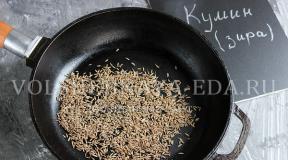Pronunciation of French words online in Russian. Rules for reading French. Vowels and letter combinations in French
French speech delights listeners with its beauty and melody. Many of us have more than once had the desire to “speak like the French,” and we frantically grabbed textbooks, dictionaries and phrase books to master this art on our own. But speaking French correctly is a real skill, which does not come easily and not right away. It is very difficult to acquire French pronunciation, even while studying in courses or individually with a teacher. However, this is not a reason to despair and quit this business. In this article we will try to explain, without complex concepts and terms, how to learn to pronounce some sounds of the French language.
Everyone recognizes French speech by the specific sound [r], this is its main distinguishing feature. It is this that poses the greatest difficulty in learning a language. At the same time, it is precisely this that most people associate with “truly” French pronunciation. So, let's learn to pronounce the sound [r] correctly.
There are many different methods to help you get the correct pronunciation of this tricky sound. One of the simplest and most common is gargling with water, and then performing the same actions, but without water. Another effective way– pronunciation of two sounds [g] and [r] together.
Some people believe that when learning sounds, you should follow the rule: the more you repeat, the better it will be. In reality, this is not the case. The main thing is to learn how to position your tongue correctly in your mouth! Since this is the most main mistake, leading to incorrect pronunciation.
Quite often, instead of the beautiful French sound [r], students end up with a slightly wheezing approximate pronunciation. The sound is not as deep as it should be, that is, not quite French.
One sound - two types of pronunciation
The first option is a “silent”, slightly harsh sound [r]. It is quite difficult to pronounce, so words consisting of letters, among which there are two consonants in a row, become a real test for students. This is felt when pronouncing words such as groupe (group), travail (work), promenade (walk), proportion (proportion, ratio), etc.
But the second one is easier to pronounce, it is closer to the original speech. As a rule, this is a combination of the sound [r] with some vowel sound. For example, radis (radish), roche (rock), rime (rhyme), etc.
What's the difference? The fact is that in the two described variants the tongue in the mouth is in different locations. In the first version, it lies flat, resting against the lower teeth, while in the second, the tongue arches, resting its tip UNDER the lower row of teeth. This is very important feature. After experimenting, you will notice that the position of the tongue changes the pronunciation. Thus, there is no need to spend hours practicing this sound, you just need to understand the principle.

Having figured out the correct position of the tongue, you can move on to consolidating the skills. French sayings with “growling” words will help here. For example, “Mon père est maire, mon frère est masseur” (“My father is the mayor, my brother is a massage therapist”) or “Dans la gendarmerie, quand un gendarme rit, tous les gendarmes rient dans la gendarmerie” (“In the gendarmerie, when a gendarme laughs, all the gendarmes laugh in the gendarmerie."
Vowel sounds [y] and [œ]
The French sound [y] will not be easy to pronounce correctly the first time. If we compare it with the sounds in the Russian language, then it is something between the phonemes [yu] and [u]. Often students pronounce this sound as Russian [у], mistakenly believing that there is no difference. However, this is very important, since incorrect pronunciation of a given phoneme can completely change the meaning of the phrase. Here's an example; “C’est une rue” (This is the street) or “C’est une roue” (This is the wheel).
The above examples are harmless, but there are also comical situations that you can get into by confusing the pronunciation of certain words. For example, "nous" is "we", and "nu" is translated as "naked"). In order not to make your interlocutors laugh or be embarrassed, you need to learn to distinguish these vowel sounds and try to pronounce them correctly. Repeating tongue twisters will help with this: “Douze douches douces” and “As-tu vu le tutu de tulle de Lili d’Honolulu?”
Say these phrases and you will notice how clearly you can hear the difference between [u] and [y]. Repeat tongue twisters as often as possible, this will help you soon learn to distinguish these sounds.
In the French language, there is another special vowel sound [œ], the correct pronunciation of which indicates that you are already a true Frenchman. This sound is the middle form between such sounds of the Russian language as [o] and [yo].
How to pronounce this sound correctly? The upper lip needs to be raised up (remember how chimpanzees do this in the wild world). Next, the pen or pencil should be placed on the raised upper lip and pressed, thus fixing this position. Then, carefully removing the stationery from your lip, you should try to pronounce the sound [œ].
To consolidate the result, read the following words several times: acteur, coeur, chaleur, soeur, peur, tracteur, directeur.
Nasal sounds
And finally, let's talk about nasal sounds. Their correct pronunciation is again due to the correct positioning of the speech apparatus. One rule should be remembered: if the sound is [e(n] - “pain”, then the position of the mouth is the same as when pronouncing the sound [ɛ], and not [a]. Students often make mistakes by confusing these sounds. For comparison: center – center.
Here, as in the case of the sounds [u] and [y], the meaning of the phrase depends on the pronunciation (the first word, for example, is translated as “center”, and the second as “hanger”). That's why it's so important to learn how to pronounce them correctly.
In conclusion, it is worth noting that if desired, anything is possible. Correct French pronunciation can be achieved if you understand the underlying phonetics and practice regularly. Good luck in your studies!
The rules for reading French are quite complex and varied, so you don’t need to try to learn them right away. It is enough to periodically glance at the table during the process of learning and consolidating the material. The main thing is to remember that reading rules exist, which means that once you master them, you will be able to read any unfamiliar word. This is why the French language does not require transcription (except for rare phonetic cases).
There are 5 important rules of the French alphabet that are unchanged and should definitely be remembered:
- the stress ALWAYS falls on the last syllable of the word (examples: argent, festival, venir);
- the letters -s, -t, -d, -z, -x, -p, -g, e, c (and their combinations) are NOT READABLE in words if they appear at the end (examples: mais, agent, fond, nez, époux, morse, banc);
- the ending of verbs in the present tense “-ent” (3l. unit h) is never read (example: ils parlent);
- the letter “l” is always softened, reminiscent of the Russian [l];
- double consonants are read as one sound in French, for example: pomme.

The French alphabet is in many ways similar to the English alphabet. If you already speak English, then the learning process will go much faster, if not, then that’s also great. It will be very interesting for you to master another language besides your native one!
In addition to the letters of the alphabet, letters with icons (superscript and subscript), presented below in the table, are used in writing.
Vowels and letter combinations in French
French vowels are pronounced according to clear rules of pronunciation, but there are many exceptions related to both analogy and the influence of neighboring sounds.
| Letter/Letter combination | Pronunciation of sound | Example |
| "oi" | semivowel [wa] | trois |
| "ui" | [ʮi] | huit [ʮit] |
| “ou”* | [u] | cour |
| “eau”, “au” | [o] | beaucoup,auto |
| “eu”, “œu”, as well as the letter e (in an open unstressed syllable) | [œ] / [ø] / [ǝ] | neuf, pneu, regarder |
| “è” and “ê” | [ɛ] | crème, tête |
| “é” | [e] | tele |
| "ai" and "ei" | [ɛ] | mais, beige |
| “y”* in the position between vowels forms | 2 "i" | royal (roi – ial = ) |
| “an, am, en, em” | nasal [ɑ̃] | enfant [ɑ̃fɑ̃], ensemble [ɑ̃sɑ̃bl] |
| “on, om” | nasal [ɔ̃] | bon, nom |
| “in, im, ein, aim, ain, yn, ym” | nasal [ɛ̃] | jardin [Ʒardɛ̃], important [ɛ̃portɑ̃], symphonie, copain |
| “un, um” | nasal [œ̃] | brun, parfum |
| "oin" | [wɛ̃] | coin |
| "ien" | [jɛ̃] | bien |
| “i” before a vowel and in combination with “il” after a vowel at the end of a word | [j] | miel, ail. |
| “ill”* | [j] – after a vowel – after a consonant | famille |
*If the letter combination “ou” is followed by a pronounced vowel, then the sound is read as [w]. For example, in the word jouer [Ʒwe].
*Located between consonants, the letter “y” is read as [i]. For example, in the word stylo.
*In a stream of speech, the fluent sound [ǝ] may be barely audible or completely dropped out of pronunciation. But there are also cases when a sound, on the contrary, can appear where it is not pronounced in an isolated word. Examples: acheter, les cheveux.
*Exceptions are the words tranquille, ville, mille, Lille, as well as their derivatives.
Correct pronunciation of consonants and letter combinations
| Letter/Letter combination | Pronunciation of sound | Example |
| “t”* | [s] before “i” + vowel [t] if “t” is preceded by “s” | national question |
| "s" | between vowels [z] [s] – in other cases | |
| "ss" | Always [s] | class |
| "x" | At the beginning of a word between vowels [ks] in other cases; [s] in cardinal numbers; [z] in ordinal numbers | exotique [ɛgzotik] Six, dix Sixième, dixième |
| “c”* | [s] before vowels “i, e, y” [k] – in other cases | |
| “ç” | always [s] | garçon |
| "g" | [Ʒ] before vowels “i, e, y” [g] – in other cases | |
| "gu" | like 1 sound [g] before vowels | guerre |
| "gn" | [ɲ] (sounds like Russian [н]) | ligne |
| "ch" | [ʃ] (sounds like Russian [ш]) | chat [ʃa] |
| "ph" | [f] | photo |
| "qu" | 1 sound [k] | qui |
| “r”* | unreadable after “e” at the end of a word | parler |
| “h”* | never read, but divided into h silent and h aspirated | homme |
| “th“ | [t] | Marthe |
*Exception words: amitié, pitié.
*The letter is not pronounced at the end of a word after nasal vowels. For example: banc. And also in words such as (porc, tabac, estomac [ɛstoma]).
*Exceptions are some nouns and adjectives: hiver, fer, cher [ʃɛ:r], ver, mer, hier.
*In French, the letter “h” plays a specific role in pronunciation:
- when h is in the middle of a word between vowels, they are read separately, for example: Sahara, cahier, trahir;
- with the silent h at the beginning of the word, a connection is made and the vowel is dropped, for example: l‘hectare, ilshabitent;
- before the aspirate h, no binding is made and the vowel sound is not dropped, for example: la harpe, le hamac, les hamacs, les harpes.
In dictionaries, words with an aspirated h are indicated by an asterisk, for example: *haut.
Cohesion, binding and other features of French phonetics
Voiced consonants should always be pronounced clearly, without deafening them at the end of the word. Unstressed vowels should also be pronounced clearly, without reducing them.
Before such consonant sounds as [r], [z], [Ʒ], [v], stressed vowels become long or acquire longitude, which is indicated in transcription by a colon. Example: base.
French words tend to lose their stress in the speech stream, since they are combined into groups that have a common semantic meaning and a common stress that falls on the last vowel. In this way, rhythmic groups are formed.
When reading a rhythmic group, be sure to observe two important rules: cohesion (French enchainement) and binding (French liaison). Without knowledge of these two phenomena, learning to hear, distinguish and understand words in a stream of French speech will be extremely difficult.
Concatenation is the phenomenon when a pronounced consonant at the end of one word forms one syllable with a vowel at the beginning of the next word. Examples: elle aime, j'habite, la salle est claire.
Linking is when the final unpronounceable consonant is pronounced by linking it with the vowel at the beginning of the next word. Examples: c'est elle or à neuf heures.
Test yourself (exercise for consolidation)
Having carefully read all the rules and exceptions, now try to read the words given in the exercises below without looking at the theoretical material.
Exercise 1
sale, date, vaste, père, mère, valse, sûr, crème, rate, tête, traverse, appeler, vite, pièce, fête, bête, crêpe, marcher, répéter, pomme, tu, armée, les, mes, pénétrer, le, je, me, ce, monopole, chat, photo, regarder, pianiste, ciel, miel, donner, minute, une, bicyclette, théâtre, paragraphe, thé, marche, physicien, espagnol.
Exercise 2
titane, attire, tissage, titi, type, tirade, active, bicyclette, gypse, myrte, cycliste, Egypte;
naïf, maïs, laïcité, naïve, haïr, laïque, abïme;
fière, bière, ciel, carrière, piège, miel, pièce, panier;
pareil, abeille, vermeil, veille, merveille;
ail, médaille, bail, travail, détail, émail, vaille, détailler;
fille, bille, grille, billet, quille, ville;
habiter, trahi, géhenne, habiller, malhabile, hériter, inhabile, Sahara;
l’herbe – les herbes, l’habit – les habits, l’haltère – les haltères;
la harpe - les harpes, la hache - les haches, la halte - les haltes, la haie - les haies.
Now you know the rules of reading French, which means you can read any text in French.
Magnificent France is a country of romance and hearts in love. Traveling to France is the dream of every couple in love. There is everything for a romantic getaway.
Nice cozy cafes, wonderful hotels, lots of entertainment and nightclubs. Holidays in France will appeal to anyone, no matter what their tastes. This is a unique, very diverse country. And if you also communicate with its inhabitants, you will completely fall in love with this wonderful corner of the Earth.
But in order to communicate with the local population, you need to know at least the basics of the French language, or have our Russian-French phrasebook at hand, which consists of important sections.
Common phrases
| Phrase in Russian | Translation | Pronunciation |
|---|---|---|
| Yes. | Oui. | Oui. |
| No. | Non. | Non. |
| Please. | S'il vous plait. | Sil wu ple. |
| Thank you. | Merci. | Mercy. |
| Thanks a lot. | Merci beaucoup. | Mercy side. |
| I'm sorry, but I can't | excusez-moi, mais je ne peux pas | excuse mua, me jyo nyo pyo pa |
| Fine | bien | bian |
| OK | d'accord | dakor |
| Yes, sure | oui, bien sûr | ui, bian sur |
| Now | tout de suite | tou de suite |
| of course | bien sûr | bian sur |
| Deal | d'accord | dakor |
| How can I be of assistance (official) | comment puis-je vous aider? | Koman puij vu zede? |
| Friends! | camarades | kamarad |
| colleagues! (official) | cheres collegues! | Shar colleague |
| young woman! | Mademoiselle! | mademoiselle! |
| Sorry, I didn't hear. | je n'ai pas entendu | zhe ne pa zantandyu |
| repeat please | repetez, si'il vous plait | rapete, sil vu ple |
| please … | ayez la bonte de… | Aye la bonte deux... |
| Sorry | pardont | sorry |
| sorry (attracting attention) | excusez-moi | excuse mua |
| we already know each other | nous nous sommes connus | well well catfish horse |
| Pleased to meet you | je suis heureux(se) de faire votre connaissance | zhe sui örö(z) de fair votr conesance |
| I am very happy) | je suis heureux | zhe shui yoryo (yorez) |
| Very nice. | enchante | Anchante |
| My last name … | mon nom de famille est... | mon nom de familia eh... |
| Let me introduce myself | parmettez - moi de me presenter | permete mua de me prezante |
| would you like to introduce | permettez - moi de vous presenter le | permete mua de vou prezante le |
| meet me | faites connaissance | fat conscience |
| what is your name? | comment vous appellez — vous? | Koman vu zaplevu? |
| My name is … | Je m'appelle | Zhe mapel |
| Let's get acquainted | Faisons connaossance | Feuzon conesance |
| there's no way I can | je ne peux pas | no no no no |
| I'd love to, but I can't | avec plaisir, mais je ne peux pas | avek plaisir, me zhe no pyo pa |
| I have to refuse you (official) | je suis oblige de refuser | zhe sui lizhe de refuse |
| in no case! | jamais de la vie! | jamais de la vie |
| never! | James! | jamais |
| This is absolutely impossible! | c'est impossible! | se tenposible! |
| thanks for the advice … | mersi puor votre conseil… | mesri pur votr consey... |
| I will think | je penserai | zhe pansre |
| I will try | je tacherai | zhe tashre |
| I will listen to your opinion | je preterai l'ireille a votre opinion | zhe prêtre leray a votre opinion |
Appeals
| Phrase in Russian | Translation | Pronunciation |
|---|---|---|
| Hello) | bonjour | bonjour |
| Good afternoon! | bonjour | bonjour |
| Good morning! | bonjour | bonjour |
| Good evening! | (bon soire) bonjoure | (bonsoir) bonjour |
| Welcome! | soyer le(la) bienvenu(e) | suae le(la) bienvenu |
| Hello! (not official) | salut | salya |
| Greetings! (official) | je vous salue | wow salyu |
| Goodbye! | au revoir! | about revoir |
| best wishes | mes couhaits | meh hustle |
| all the best | mes couhaits | meh hustle |
| see you soon | a bientôt | a biento |
| till tomorrow! | a demain! | a dyomen |
| Farewell) | adieu! | Adyo |
| allow me to take my leave (official) | permettez-moi de fair mes adieux! | permete mua de fair me zadiyo |
| Bye! | salut! | salya |
| Good night! | bon nuit | bon nuits |
| Bon Voyage! | bon voyage! bonne route! | bon voyage! bon root! |
| Hello yours! | saluez votre famile | salue votr famiy |
| How are you? | comment why? | coman sa va |
| What's up? | comment why? | coman sa va |
| OK, thank you | merci, ca va | merci, sa va |
| Everything is fine. | ça va | sa wa |
| everything is the same | comme toujours | com tujour |
| Fine | ça va | sa wa |
| Wonderful | tres bien | tre bien |
| not complaining | ça va | sa wa |
| doesn't matter | tout doucement | that dusman |
At the station
| Phrase in Russian | Translation | Pronunciation |
|---|---|---|
| where is the waiting room? | qu est la salle d'attente& | u e la salle datant? |
| Has the registration already been announced? | A-t-on deja annonce l'enregistrement? | aton deja announce lanrözhiströman? |
| Has the boarding been announced yet? | a-t-on deja annonce l'atterissage? | aton deja announce laterisage? |
| please tell me flight no.... is delayed? | dites s'il vous plaît, le vol numero... est-il retenu? | dit silvuple, le vol numero... ethyl retönü? |
| where does the plane land? | Òu l'avion fait-il escale? | Lavion fetil escal? |
| is this flight direct? | Est-ce un vol sans escale? | es en vol san zeskal? |
| what is the flight duration? | combien dure le vol? | combien du le vol? |
| I would like a ticket to... | s'il vous plaît, un billet a des tination de... | Sil vouple, en biye a destinacion de... |
| how to get to the airport? | comment puis-je arriver a l’aeroport? | Coman puijarive à laéropor? |
| is the airport far from the city? | Est-ce que l'aeroport est loin de la ville? | esque laéropor e luin de la ville? |
At customs
| Phrase in Russian | Translation | Pronunciation |
|---|---|---|
| customs inspection | controle douanier | Duanier control |
| customs | douane | duan |
| I have nothing to declare | je n'ai rien a daclarer | zhe ne rien a deklyare |
| can I take my bag with me? | Est-ce que je peux prendre ce sac dans le salon? | esko zhe pyo prandr se sak dan le salyon? |
| I only have hand luggage | je n'ai que me bags a main | zhe ne kyo me luggage a men |
| business trip | pour affairs | pur scam |
| tourist | comme touriste | com tourist |
| personal | sur invitation | sur evitation |
| This … | je viens... | zhe vien... |
| exit visa | de sortie | De Sortie |
| entry visa | d'entree | dantre |
| transit visa | de transit | de transit |
| I have … | j'ai un visa... | je en visa... |
| I am a citizen of Russia | je suis citoyen(ne) de Russie | zhe shuy situationen de ryusi |
| here's your passport | voici mon passeport | voisy mon pasport |
| Where is passport control? | qu controle-t-on les passeport? | u control-ton le pasport? |
| I have... dollars | j'ai...dollars | zhe...dolyar |
| They are gifts | ce sont des cadeaux | syo son de kado |
In a hotel, hotel
| Phrase in Russian | Translation | Pronunciation |
|---|---|---|
| can i reserve a room? | Puis-je reserver une chambre? | Puige reserve yun chambre? |
| room for one. | Une chambre pour une personne. | Un chambre pur yung person. |
| room for two. | Une chambre pour deux personnes. | Un chambre pour de person. |
| I have a number reserved | on m'a reserve une chambre | he ma reserve un chambre |
| not very expensive. | Pas très cher. | Pa tre shar. |
| how much does a room cost per night? | Combien coute cette chambre par nuit? | Combian cut set chambre par nuit? |
| for one night (for two nights) | Pour une nuit (deux nuits) | Pur yun newy (de newy) |
| I would like a room with a telephone, TV and a bar. | Je voudrais une chambre avec un telephone, une television et un bar. | Jeu voodray youth chambre avek on telefon youth television e on bar |
| I booked a room under the name Catherine | J'ai reserve une chambre au nom de Catherine. | Jae réservé youth chambre au nom deux Catherines |
| please give me the keys to the room. | Je voudrais la clef de ma chambre. | Jeu voodray la claff deux ma chambre |
| are there any messages for me? | Avevu de masaj pur mua? | |
| What time do you have breakfast? | Avez-vous des messages pour moi? | And kel yor servevu lepeti dezhene? |
| Hello, reception, could you wake me up tomorrow at 7 am? | Hello, la reception, pouvez-vous me reveiller demain matin a 7 heures? | Ale la reseptsion puve vu me reveye dyoman matan a set(o)or? |
| I'd like to pay it off. | Je voudrais regler la note. | Zhe voodre ragle A not. |
| I will pay in cash. | Je vais payer en especes. | Jeu ve paye en espas. |
| I need a single room | pour une personne | Jae Beuzouin Dune Chambre Puryun Person |
| number… | dans la chambre il-y-a… | Dan La Chambre Ilya... |
| with phone | un telephone | en phone |
| with bath | une salle de bains | un sal de bain |
| with shower | une douche | un shower |
| with TV | un poste de television | en post de television |
| with refrigerator | un refrigerateur | en refrigerated |
| room for a day | (une) chambre pour un jour | un chambre pour en jour |
| room for two days | (une) chambre pour deux jours | un chambre pour de jour |
| what is the price? | combien coute... ? | combien cut...? |
| what floor is my room on? | a quel etage se trouve ma chambre? | and kaletazh setruv ma chambre? |
| where is … ? | qu ce trouve (qu est…) | u setruv (u e) ...? |
| restaurant | le restaurant | le restaurant |
| bar | le bar | le bar |
| elevator | l'ascenseur | lasseur |
| cafe | la cafe | le café |
| room key please | le clef, s'il vous plait | le clay, sil vou ple |
| please take my things to the room | s'il vous plait, portez mes valises dans ma chambre | Sil vu ple, porte mae valise dan ma chambre |
Walking around the city
| Phrase in Russian | Translation | Pronunciation |
|---|---|---|
| where can I buy...? | qu puis-je acheter…? | u puij ashte...? |
| city map | le plan de la ville | le place de la ville |
| guide | le guide | le guide |
| what to see first? | qu'est-ce qu'il faut regarder en premier lieu? | Keskilfo rögarde en prêmie lieu? |
| it's my first time in Paris | c'est pour la premiere fois que je suis a Paris | se pur la premier foie kyo zhe xui e pari |
| what is the name of …? | comment s'appelle...? | koman sapel...? |
| this street | cette rue | set ryu |
| this park | ce parc | syo park |
| Here "- where exactly …? | qu se trouve...? | syo truv...? |
| railway station | la gare | A la garde |
| please tell me where is...? | dites, s’il vous plait, où se trouve...? | dit, silvuple, u se truv...? |
| hotel | l'hotel | letel |
| I'm a newcomer, help me get to the hotel | je suis etranger aidez-moi, a arriver a l’hotel | zhe syu zetranzhe, ede-mua a arive a letel |
| I'm lost | je me suis egar | zhe myo shui zegare |
| How can I get to …? | comment aller...? | koman tale...? |
| to the city center | au center de la ville | o center de la ville |
| to the station | a la gare | a la garde |
| how to get outside...? | comment puis-je arriver a la rue...? | coman puige arive a la rue...? |
| it is far from here? | c'est loin d'ici? | se luan disi? |
| can you get there on foot? | Puis-je y arriver a pied? | puige et arive à pieux? |
| I'm looking for … | je cherche... | wow shersh... |
| bus stop | l'arret d'autobus | Lyare Dotobus |
| exchange office | la bureau de change | la bureau de change |
| where is the post office? | qu se trouve le bureau de poste | ou se trouve le bureau de post? |
| please tell me where is the nearest department store | dites s'il vous plait, qu est le grand magasin le plus proche | dit silvuple u e le grand magazin le plus proche? |
| telegraph? | le telegraph? | le telegraph? |
| where is the pay phone? | qu est le taxiphone | Do you have a taxiphone? |
In transport
| Phrase in Russian | Translation | Pronunciation |
|---|---|---|
| Where can I get a taxi? | Ou puis-je prendre un taxi? | U puige prand en taxi? |
| Call a taxi, please. | Appelez le taxi, s’il vous plait. | Aple le taxi, sil vou ple. |
| How much does it cost to get to...? | Quel est le prix jusqu'a...? | Kel e le pri zyuska...? |
| Take me to... | Deposez-moi a… | Depose mua a... |
| Take me to the airport. | Deposez-moi a l'aeroport. | Depose mua a laeropor. |
| Take me to the train station. | Deposez-moi a la gare. | Depoze mua a la garde. |
| Take me to the hotel. | Deposez-moi a l'hotel. | Depose mua a letel. |
| Take me to this address. | Conduise-moi a cette adresse, s’il vous plait. | Conduize mua a set address sil vu ple. |
| Left. | A gauche. | A gosh. |
| Right. | A droite. | A druat. |
| Directly. | Tout droit. | Tu drois. |
| Stop here, please. | Arretez ici, s’il vous plait. | Arete isi, sil vu ple. |
| Could you wait for me? | Pourriez-vouz m'attendre? | Purye vu matandr? |
| This is my first time in Paris. | Je suis a Paris pour la premiere fois. | Jeux suey a pari pour la premier foie. |
| This is not my first time here. The last time I was in Paris was 2 years ago. | Ce n'est pas la premiere fois, que je viens a Paris. Je suis deja venu, il y a deux ans. | Se ne pa la premier foie kyo zhe vyan a Pari, zhe suey dezha venu Ilya dezan |
| I've never been here. It is very beautiful in here | Je ne suis jamais venu ici. C'est tres beau | Zhe no suey jamais wenyu isi. Se tre bo |
In public places
Emergencies
| Phrase in Russian | Translation | Pronunciation |
|---|---|---|
| Help! | Au secours! | Oh sekur! |
| Call the police! | Appelez la police! | Apple la polis! |
| Call a doctor. | Appelez un medecin! | Apple en medsen! |
| I'm lost! | Je me suis egare(e) | Zhe myo shui egare. |
| Stop the thief! | Au voleur! | Oh aviary! |
| Fire! | Au feu! | Oh fyo! |
| I have a (small) problem | J'ai un (petit) probleme | same yon (peti) problems |
| help me please | Aidez-moi, s'il vous plait | ede mua sil wu ple |
| What's wrong with you? | Que vous arrive-t-il? | Kyo wuzariv til |
| I feel bad | J'ai un malaise | Je(o)yon malez |
| I'm sick | J'ai mal au coeur | Zhe mal e keur |
| I have a headache/stomach ache | J'ai mal a la tete / au ventre | Zhe mal a la tête / o ventre |
| I broke my leg | Je me suis casse la jambe | Zhe myo suey kase lajamb |
Numerals
| Phrase in Russian | Translation | Pronunciation |
|---|---|---|
| 1 | un,une | en, yun |
| 2 | deux | doyo |
| 3 | trois | Troyes |
| 4 | quatre | kyatr |
| 5 | cinq | senk |
| 6 | six | sis |
| 7 | sept | seth |
| 8 | huit | whit |
| 9 | neuf | noef |
| 10 | dix | dis |
| 11 | onz | onz |
| 12 | douze | duz |
| 13 | treize | trez |
| 14 | quatorze | kyatorz |
| 15 | quinze | kenz |
| 16 | seize | sez |
| 17 | dix-sept | diset |
| 18 | dix-huit | disuit |
| 19 | dix-neuf | disnoef |
| 20 | vingt | van |
| 21 | vingt et un | wen te en |
| 22 | vingt-deux | wen doyo |
| 23 | vingt-trois | van trois |
| 30 | trente | trant |
| 40 | quarante | tran te en |
| 50 | cinquante | sankant |
| 60 | soixante | Suasant |
| 70 | soixante-dix | suasant dis |
| 80 | quatre-vingt(s) | Quatreux van |
| 90 | quatre-vingt-dix | Quatreux Van Dis |
| 100 | cent | san |
| 101 | cent un | santen |
| 102 | cent deux | san deo |
| 110 | cent dix | san dis |
| 178 | cent soixante-dix-huit | san suasant dis unit |
| 200 | deux cents | de san |
| 300 | trois cents | trois sains |
| 400 | quatre cents | Quatro San |
| 500 | cinq cents | Sank-san |
| 600 | six cents | si san |
| 700 | sept cents | set san |
| 800 | huit cents | Yui-san |
| 900 | neutral cents | nave dignity |
| 1 000 | mille | miles |
| 2 000 | deux mille | de miles |
| 1 000 000 | un million | en million |
| 1 000 000 000 | un billion | en miliar |
| 0 | zero | zero |
In the shop
| Phrase in Russian | Translation | Pronunciation |
|---|---|---|
| please show me this. | Montrez-moi cela, s’il vous plait. | montre mua selya, sil vu ple. |
| I would like to… | Je voudrais... | wowdre... |
| give it to me please. | Donnez-moi cela, s’il vous plait. | done mua selya, sil vu ple. |
| How much does it cost? | Combien ca coute? | kombyan sa kut? |
| what is the price? | C'est combien? | combien cut |
| please write this. | Ecrivez-le, s'il vous plait | ecrive le, sil vu ple |
| too expensive. | C'est trop cher. | se tro sher. |
| it's expensive/cheap. | C'est cher / bon marche | se cher / bon marche |
| sale. | Soldes/Promotions/Ventes. | sold/Promotion/Vant |
| can I try this on? | Puis-je l'essayer? | Puige l'esaye? |
| Where is the fitting room located? | Ou est la cabine d'essayage? | U e la cabin desayage? |
| my size is 44 | Je porte du quarante-quatre. | Jeu port du querant quatr. |
| do you have this in XL size? | Avez-vous cela en XL? | Ave vu selya en ixel? |
| what size is it? (cloth)? | C'est quelle taille? | Se kel tai? |
| what size is it? (shoes) | C'est quelle pointure? | Se quel pointure? |
| I need a size… | J'ai besoin de la taille / pointure… | Jae beuzuan de la tai/pointure |
| do you have….? | Avez-vous… ? | Ave wu...? |
| do you accept credit cards? | Acceptez-vous les cartes de credit? | Acceptevu le carte de cred? |
| do you have an exchange office? | Avez-vous un bureau de change? | Avevu he bureau de change? |
| What time do you work until? | A quelle heure fermez-vous? | And kel yor ferme wu? |
| Whose production is this? | Ou est-il fabrique? | At the ethyl factory? |
| I need something cheaper | je veux une chambre moins chere | jeu veu un chambre mouen cher |
| I'm looking for a department... | je cherche le rayon... | jeu cherche le rayon... |
| shoes | des chaussures | de chaussure |
| haberdashery | de mercerie | de mercery |
| cloth | des vetements | De Whatman |
| can I help you? | Puis-je vous aider? | puij vuzade? |
| no thanks, I'm just looking | non, merci, je regarde tout simplement | non, merci, zhe regard tu sampleman |
| When does the store open (close)? | Quand ouvre (ferme) se magasin? | kan uvr (ferm) sho magazan? |
| Where is the nearest market? | Q'u se trouve le marche le plus proche? | ou sé trouve le marche le pluse proch? |
| you have …? | avez-vous...? | awe-woo...? |
| bananas | des bananes | da banana |
| grape | du raisin | du rezin |
| fish | du poisson | du poisson |
| kilogram please... | s'il vous plait un kilo... | sil vuple, en kile... |
| grapes | de raisin | de resen |
| tomato | de tomatoes | de tomato |
| cucumbers | de concombres | de concombre |
| give me please … | donnes-moi, s’il vous plait… | done-mua, silpuvple... |
| a pack of tea (butter) | un paquet de the (de beurre) | en pake de te (de beur) |
| box of chocolates | une boite de bonbons | un boit de bonbon |
| jar of jam | un bocal de confiture | en glass de confiture |
| bottle of juice | une bou teille de jus | un butei de ju |
| loaf of bread | une baguette | un baguette |
| a carton of milk | un paquet de lait | en paquet deux |
At the restaurant
| Phrase in Russian | Translation | Pronunciation |
|---|---|---|
| what is your signature dish? | qu set-ce que vous avez comme specialites maison? | kesko vvu zave com specialite maison? |
| Menu, please | le menu, s’il vous plait | le menu, silvuple |
| what do you recommend to us? | que pouvez-vouz nous recommander? | kyo puve-woo nu ryokomande? |
| Is it busy here? | la place est-elle occupee? | la place etale ocupé? |
| for tomorrow, at six o'clock in the evening | pour demain a six heures | pour d'aumain a ciseur du soir |
| Hello! can I reserve a table...? | Hello! Puis-je reserver la table...? | Hello, puige réserve la table...? |
| for two | pour deux | pour deux |
| for three persons | pour trois | pour trois |
| for four | pour quatre | pur qatr |
| I invite you to a restaurant | je t'invite au restaurant | same tenvit o restaurant |
| let's have dinner at a restaurant today | allons au restaurant le soir | al'n o restaurant le soir |
| here's a cafe. | boire du cafe | boir du cafe |
| where can …? | qu peut-on...? | u peton...? |
| eat delicious and inexpensive | manger bon et pas trop cher | manzhe bon e pa tro cher |
| have a quick snack | manger sur le pouce | mange sur le pousse |
| to drink coffee | boire du cafe | boir du cafe |
| Please … | s'il vous plait... | silvuple.. |
| Omelet with cheese) | une omlette (au fromage) | un omelette (o fromage) |
| sandwich | une tarine | un tartine |
| Coca Cola | un coca-cola | en coca cola |
| ice cream | une glace | un glace |
| coffee | un cafe | en cafe |
| I want to try something new | je veux gouter quelque chose de nouveau | zhe ve gute quelköshoz de nouveau |
| please tell me what is...? | dites s'il vous plait qu'est ce que c'est que...? | dit silvuple kyoskose kyo...? |
| Is this a meat (fish) dish? | c'est un plat de viande / de poisson? | seten place de viand/de poisson? |
| would you like to try the wine? | ne voulez-vous pas deguster? | no vule-woo pa deguste? |
| what do you have …? | qu'est-ce que vous avez....? | keskyo wu zawe...? |
| for a snack | comme hors d'oeuvre | com order |
| for dessert | comme dessert | com deser |
| what drinks do you have? | qu'est-se que vous avez comme boissons? | kesko vu zave com buason? |
| bring it please … | apportez-moi, s’il vous plait… | aporte mua silvuple... |
| mushrooms | les champignons | le champignon |
| chicken | le poulet | Le Poulet |
| Apple pie | une tart aux pommes | un tart o pom |
| I would like some vegetables please | s’il vous plait, quelque chose de legumes | silvuple, quelkyo shoz de legum |
| I am a vegetarian | je suis vegetarien | zhe sui vezhetarien |
| me please... | s’il vous plait… | silvuple… |
| fruit salad | une salade de fruits | un salad d'frui |
| ice cream and coffee | une glace et un cafe | un glas e en cafe |
| delicious! | c'est tr'es bon! | se tre bon! |
| your kitchen is great | votre cuisine est excellente | votr cuisin etexelant |
| The check, please | l'addition, s'il vous plait | Ladysion Silvuple |
Tourism
| Phrase in Russian | Translation | Pronunciation |
|---|---|---|
| Where is the nearest exchange office? | Ou se trouve le bureau de change le plus proche? | U se trouve le bureau de change le pluse proche? |
| Can you change these traveler's checks? | Remboursez-vous ces cheques de voyage? | Rambourse vu se shek de voyage? |
| What is the exchange rate? | Quel est le cours de change? | Quel e le cour de change? |
| How much is the commission? | Cela fait combien, la commission? | Selya fe combian, la commission? |
| I want to exchange dollars for francs. | Je voudrais changer des dollars US contre les francs francais. | Zhe vudre change de dolyar U.S. contra le franc français. |
| How much will I get for $100? | Combien toucherai-je pour cent dollars? | Kombyan tusrej pur san dolyar? |
| What time do you work until? | A quelle heure etes-vous ferme? | And kel yor etvu ferme? |
Greetings - a list of words with which you can greet or say hello to the people of France.
Standard phrases are all you need to maintain or develop a conversation. Common words used in conversation every day.
Station – questions frequently asked at train stations and general words and phrases that will be useful both at the railway station and at any other station.
Passport control - upon arrival in France, you will have to go through passport and customs control, this procedure will be easier and faster if you use this section.
Orientation in the city - if you don’t want to get lost in one of the big French cities, keep this section from our Russian-French phrasebook handy. With its help you will always find your way.
Transport – when traveling around France, you will often have to use public transport. We have collected translations of words and phrases that will be useful to you in public transport, taxi and more.
Hotel – translation of phrases that will be very useful to you during registration at the hotel and throughout your stay.
Public places – using this section you can ask passers-by what interesting things you can see in the city.
Emergencies are a topic that should not be neglected. With its help, you can call an ambulance, the police, call passers-by for help, report that you are feeling unwell, etc.
Shopping – when going shopping, don’t forget to take a phrasebook with you, or rather this topic from it. Everything in it will help you make any purchases, from vegetables at the market to branded clothing and shoes.
Restaurant - french cuisine famous for its sophistication and you will most likely want to try its dishes. But in order to order a meal, you need to know at least minimal French in order to be able to read the menu or call the waiter. In this regard, this section will serve you as a good assistant.
Numbers and figures - a list of numbers, starting from zero to a million, their spelling and correct pronunciation in French.
Tours - translation, spelling and correct pronunciation of words and questions that will be useful to every tourist more than once on their trip.



















